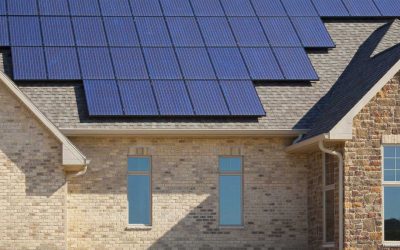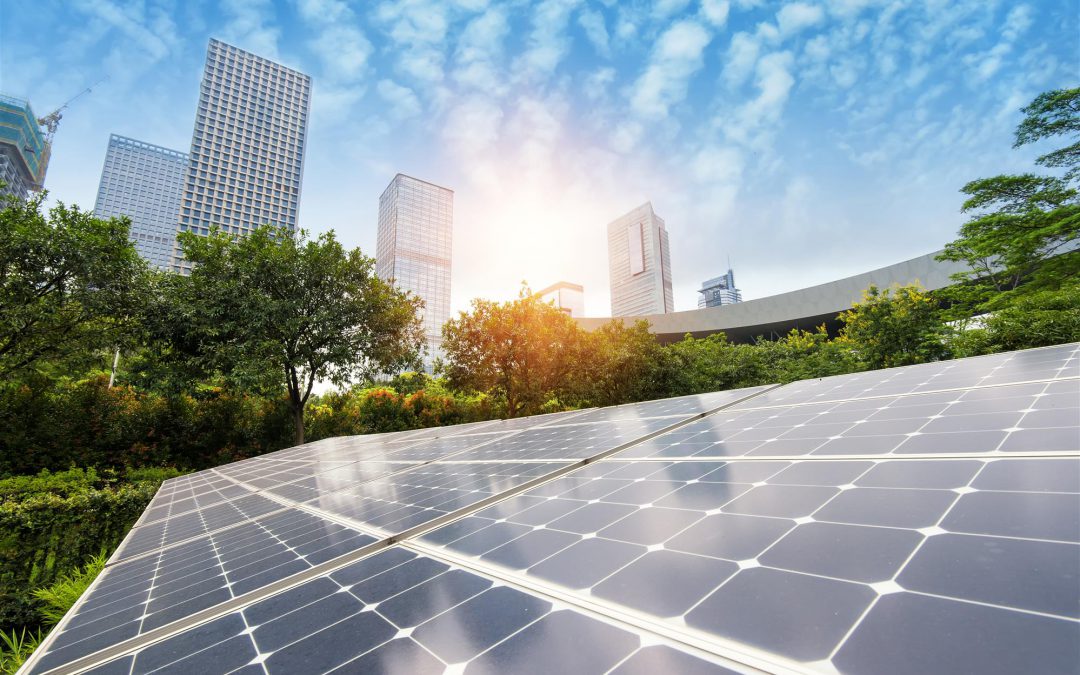
Dec 20, 2017
A 2014 report from the Solar Energy Industries Association showed that to date, over 600,000 American homes have acquired solar panels. While the market for solar is growing, and the benefits are clear, buying vs. leasing of solar panels remains one of the most difficult decisions facing homeowners.
Both buying and leasing present a unique set of advantages, but the answer depends on the homeowner’s specific situation. Beyond reducing your electricity bills, here are some factors – both qualitative and quantitative – to consider in favor of buying solar panels.
A house with solar panels is considered more valuable Solar panels tend to increase the value of a house because it makes it more energy efficient. When you buy your solar systems, you don’t have to worry about the transfer issue in the event that you sell the house and it also seems more attractive to buyers.
Removing solar panels can damage roofs
Suppose you lease your solar panels for 20 years, have them installed and then decide to move. Your lease doesn’t automatically transfer to your new house (if it can even accommodate the old system). Some companies offer to relocate it and this could cost at least $1,000 for an audit and transfer of the panels. Your lessor will then have to remove the panels, which would leave holes on the roof that were there to bolt the panel frames. These could in turn cause leaks that the lessor isn’t obligated to repair. This would also drive away potential buyers who would have to face the consequences of it.
Solar power systems are self-maintained
Once you purchase the solar system, you are responsible for its maintenance. Fortunately, most solar panel systems require little to no maintenance and typically come with a protection plan. Therefore, it’s not something for you to worry about. The cost of energy is protected from inflation Once you pay your solar systems in full, you will still be able to take advantage of the sun, which will maintain the cost of your energy. You will not have to worry so much about the going rate of electricity (and you’ll pay less for it) because your solar panels will continue to produce energy as long as long as they’re facing the sun.
The return on investment is larger when you buy
A house typically needs a solar system in the range of 5kW and 7kW. Depending on the quality and efficiency of the system, the price could be in the range of 20 to 30K. With the combined benefits of a 30% tax credit, more than 70% savings on electricity, feed-in tariff (FIT) value and solar renewable energy credit (SREC), you can get an 11% return on investment within 5 to 7 years. You lose these benefits with leasing where the return on investment is generally less than 6%.
To calculate the exact ROI you can expect on your solar system with buying and leasing, click here for our Leasing vs Buying Calculator for New Jersey homeowners.

Dec 15, 2017
Governor-elect Phil Murphy’s policies spell a bright future ahead for Solar Energy in New Jersey
Phil Murphy won Tuesday’s Gubernatorial election as expected – but the biggest winners prove to be renewable energy homeowners, consumers, jobseekers and businesses. While historically, New Jersey has ranked highest for its pro-solar policies and various incentives, in the past few years there has been a decline in the growth of solar, and a crash in the price of Solar Renewable Energy Credits (SRECs). Murphy’s win assures a brighter future ahead for solar energy in New Jersey. This is why solar advocates, homeowners and entrepreneurs are excited:
1. Murphy has pledged to raise the renewable portfolio standard (RPS) for utilities right away
During Christie’s term as governor, his energy policy focused almost exclusively on traditional fossil fuel as sources of power – meaning government subsidies and incentives largely supported building natural gas infrastructure, and keeping prices down for natural gas; often at the expense of wind or solar power. That meant an expansion of natural gas infrastructure, and a slowdown on investment in solar and wind energy in New Jersey. In sharp contrast, Murphy plans to raise the minimum amount of electricity purchased by the utility companies from renewable sources. This will lead to an increased demand for solar energy generated from homeowners - raising the price of SRECs. For solar-savvy producers and consumers, they already know that a higher SREC price means higher income for homeowners via net-metering. This allows for a quicker payback period on solar panel systems and a higher return-on-investment over the life of the panels (which are typically insured for 25 years).
2. Making NJ A Clean Energy State By 2050
The governor-elect plans to set a deadline of 2050 for the state of New Jersey to source all of its energy from renewable sources; a game changer for everyone, even those outside of New Jersey. The deadline coincides with scientific findings that predict a 3.6 degree Fahrenheit global rise in temperature will happen by 2050, after which climate change will get dangerous. This shift in policy offers residents a sense of security, and knowledge that supporting solar and renewable energy is a priority for the NJ government.
But it’s not just environmental activists who can cheer for this bold move by Murphy. This clearly gives renewable energy providers the opening they have been looking for to expand in New Jersey – if not the whole region – which means more new businesses, more new jobs, more competition, and opportunities to help diversify New Jersey’s economy as well as its energy supply.nt.
3. Plans To Strengthen The Grid
Power outages during the likes of Sandy in 2012 and Hurricane Irene in 2011 were crippling for homeowners and businesses alike, but Governor elect Murphy plans to safeguard New Jersey residents from future power outages by prioritizing investment in resilient electric grid infrastructure. He’s’d doing that by mandating the creation of 600 megawatts of energy storage by 2021 ; enough to power some 390,000 homes ; and 2,000 megawatts of storage to be deployed by 2030, which would be enough to power 1.3 million New Jersey homes.
Aside from this making storage units more in-demand and potentially cheaper, with renewables being the driving source of power, more homeowners, businesses and public entities can weather a storm (pun intended) without losing power. Additionally, a localized, diverse, renewable power source means a decrease in loss of power through transmission and loss of tax dollars to repair an ageing grid – critical since NJ taxpayers are likely to bear the full costs, given President Trump’s priority for improving national infrastructure seems to have stalled for at least this next fiscal year. Overall, New Jersey residents who rely on renewables or not can all expect faster restoration times and fewer rolling blackouts during peak energy use periods.
4. The First Step Towards Solving a Problem Is Admitting You Have One!
Murphy knows this and openly acknowledges that humans are causing climate change. We all want our elected officials to be conscientious, transparent and honest. But this open declaration coupled with the boldness of the 2050 clean energy pledge indicates a desire to be forward-thinking when it comes to renewables. This is something that few states in America have done; resulting in conceding our renewable energy growth, and a shift of entrepreneurial opportunities to foreign markets, businesses and investors.
Given that Christie disbanded the office of climate change within the State Department of Environmental Protection in 2010; and in 2015, dismissed scientists’ warnings that climate change is an existential crisis for humanity’s survival; we can expect a pretty big contrast between Christie’s and Murphy’s administrations. Murphy already said he would “reinstate the office of climate change,” to “ensure that impartial, fact-based scientific principles” guide state policy.
5. Rejoining the Regional Greenhouse Gas Initiative (RGGI) as one of his first acts in office
In 2015, Gov. Christie backed New Jersey out of the RGGI, an initiative in solidarity of policy and efforts to limit the emission of Greenhouse gases. Paul Murphy has pledged to re-join the RGGI as one of his first acts in office. “Economic growth and environmental protection are not mutually exclusive,” says Murphy. “We can base a new and stronger middle class on innovation and clean energy, and ensure all communities take part.” We’re more confident than ever, of a brighter future for owners of Solar Panel Systems in New Jersey moving forward. If you have been debating about going solar for your home or business, Governor-elect Murphy just made the decision a lot easier and cheaper – if not an outright money-maker, without the risk of other investment options. Aquantum Solar is excited to have a Governor who understands the moral, environmental, economic opportunity of moving toward a clean energy economy in New Jersey.
The only question now is – do the rest of us?

Dec 10, 2017
This last week the GOP Senate proposed Tax reforms passed the United States Senate by a thin margin 51-49. For utilities and entrepreneurs interested in installing Solar, this likely isn’t good news. For potential residential solar purchasers or installers, it’s not as clear.
As reported by the American Prospect, “The House bill, released in early November, proposed cutting the Production Tax Credit (PTC) for renewables by a third, eliminating the Investment Tax Credit for solar production, and repealing the electric vehicle purchase credit.”
The generous window of government incentives for solar (and renewables in general) may be starting to close, with the first reduction of Federal Investment Tax Credits or “ITC” for Solar beginning in 2019. However, under the competing Tax plans that were adopted by the United States House of Representatives and Senate over the last month it is becoming more likely that large-scale solar installation projects will be hit hard first.
While many analysts are assuming the Senate and House negotiations over the competing bills will be swift – getting final legislation to President Trump’s desk for his signature in time for the next tax year – it is anyone’s guess if the ITC and the Tax Credits for Production of Solar will be there in its’ current form.
Although, the future of the 30% Federal Solar Tax Credit for homeowners who install solar under the ITC is scheduled to be phased out beginning in 2019; deficit hawks are swirling over fat Federal Tax Credits and other personal tax deductions that can be slashed to help balance a ballooning Trump budget.
With a significant increase in the national debt being predicted by the Congressional Budget Office (CBO), largely due to steep tax cuts in the Federal Corporate Tax rate, it would not surprise most political observers to see generous Tax Credits like the ITC be on a target list for cuts.
If Congressional leaders are comfortable cutting tax exemptions for children and deductions for paying state taxes, how hard will it be, for those same leaders, to make cuts to renewable energy tax incentive programs?
In New Jersey, where homeowners are also losing a large personal deduction on their Federal taxes, this becomes an increasingly tough package for many residents. For Governor-Elect Murphy – who has championed an all renewable energy economy – this isn’t good news either.
For New Jersey homeowners, business owners and entrepreneurs who have been considering solar panel installation, but have been unsure of when is the best time; make no mistake – the time is now.

Dec 5, 2017
May saving money and doing good for planet Earth rank high on everyone’s to-do list. Going solar helps you achieve both.
Mahatma Gandhi said, “Be the change you wish to see in the world.”
The world is still dependent on fossil fuels as the most common energy source. The carbon emissions as a result of this dependence have led to the Greenhouse Effect, as well as global warming. It is incumbent upon us to alleviate this problem, by shifting our dependence from fossil fuels to alternative energy such as solar.
Switching over to solar energy helps with a lot more than just a lower electric bill. The benefits of solar energy to the environment are also a
great reason to go solar early on in the new year.
1. INVEST IN POWER FOR THE LONG TERM
While fossil fuels are running low as a resource, solar-generated energy is inexhaustible. As long as the sun is shining we will be able to produce clean energy from its light. Investing in a solar system ensures a continuous supply of energy, no matter what.
2. SAVE THE ENVIRONMENT FROM TOXIC EMISSIONS
The energy generated through solar is clean and green, and there are no carbon emissions produced. Although coal power plants filter their emissions, trace amounts of toxic particles are released through the air filtering systems into the atmosphere. Mercury is one of the pollutants that enter the air from coal power plant emissions, and contaminated the atmosphere, affecting everything from plant life to human habitation. Because solar power is emissions-free, it is safer for the environment.
3. PROTECT HABITATS AND PEOPLE AFFECTED BY MINING
The areas surrounding coal and uranium mines are usually devastated, due to the heavy equipment and waste products which can render the surrounding land barren and unusable after the mine is no longer in use. Coal mining is also dangerous to the health of workers who operate the mines. Switching to solar panels reduces dependency on mining for fossil fuels and eliminates the dangers to both miners and the environment.
4. REDUCE THE WORLD’S NEED FOR NUCLEAR POWER
Nuclear power is sometimes wrongly classified as a clean or “green” energy source due to the lack of air pollution associated with it, but it does generate harmful waste. Nuclear fission reactors have been controversial because of the long-lasting nuclear waste they produce and the possibility of catastrophic events, such as the meltdown in Chernobyl (in Russia) and Fukushima (in Japan).
5. SAVE MONEY
Because sunlight is available at no cost, solar panels do not require expensive mining and fuel processing. Once a solar panel is built, it is a free-standing operation. This is one of the many factors contributing to the significantly lower costs of solar energy. Solar customers across the United States who invest in a solar panel system typically recover their investment in 5-7 years, and offset their electric bill entirely. They’re also protected from the rising costs of energy from fossil fuels.
6. PROMOTE ENERGY INDEPENDENCE
Countries that obtain oil and other fuel sources from other nations are dependent upon and beholden to their suppliers, which sometimes has them compromise their safety and principles in order to trade with their suppliers. In 2016 alone, 25% of the United States’ petroleum consumption came from overseas sources. Switching to solar energy reduces dependence on fossil fuel consumption and leads the way for your neighbors, friends and relatives to follow. We can collectively make a difference in reducing our country’s dependence on fossil fuel imports from other countries.
With the laws and regulations undergoing constant scrutiny, there’s no doubt that things are changing fast for renewal energy in the States. Recent legislation have kept the 30% federal tax credits for new solar panel systems in place thru 2018, though the program is set to gradually end in 2021. There is no doubt that this will shift things for renewable energy, but acting NOW ensures the future for us, the planet and generations to come!

Dec 1, 2017
This past week, Congress adopted the final tax reform package that President Trump will likely sign into law early in the New Year.
While renewable energy entrepreneurs and investors have criticized the legislation – in particular, as it related to the dismantling of the “Production Tax Credit (PTC)”, homeowners can breathe a sigh of relief that the generous 30% federal solar tax credit (ITC) program remains intact for 2018. For homeowners who have been deliberating whether or not to proceed with a home solar installation project, the continuation of the program should provide a sense of encouragement, relief and urgency.
The ITC – which provides for a 30% tax credit towards the costs homeowners incur for installing a solar power system – will continue to be a major selling point for purchasers who are focused on their short, as well as long term return on investment.
But with the gradual ITC decreasing beginning of 2019 – with a complete elimination of the credit in 2021 – the sun may never be shining more brightly for homeowners looking to purchase solar. At least for now.
One thing is for certain; the renewable energy economy and it’s proponents are growing quickly. As Brad Plumer of the New York Times wrote, “The intense scrutiny toward the tax bill highlights how much the recent growth in renewable energy still depends, to some extent, on policy choices.”
If 2017 was a year marked by uncertainty and scrutiny for the renewable industry; 2018 on the surface, appears to be a year of resurgence for solar.





